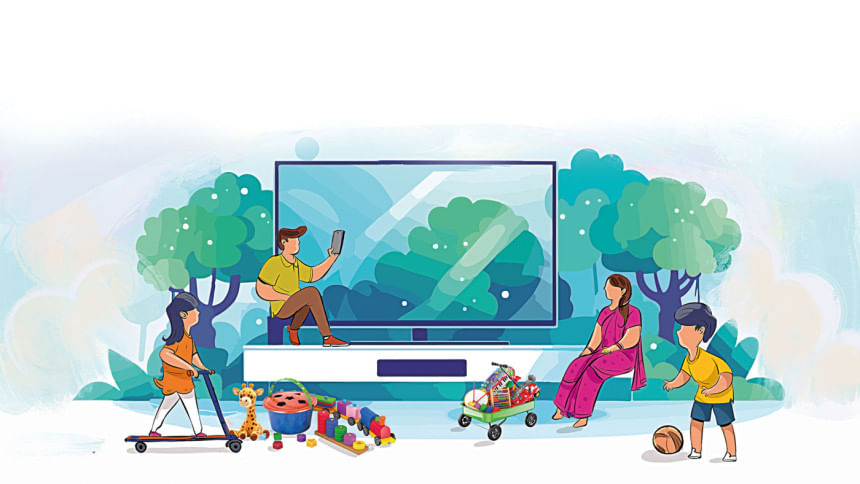Beyond streaming: How AI is making TVs smarter in Bangladeshi homes

For decades, television meant passive consumption. You flipped channels, adjusted the volume, and perhaps argued over the remote. But a quiet revolution is underway—one that is reimagining the screen not merely as a window to the world, but as a responsive, thinking companion. The rise of artificial intelligence (AI) in smart TVs is pushing both the industry and the viewing experience into an entirely new dimension.
In Bangladesh, where the television market is rapidly evolving, AI is not just a futuristic promise. It is already shaping how people watch, interact, and choose their next device.
Beyond smart: What makes an AI TV different
Smart TVs have been around for over a decade, defined by their internet connectivity and app-based platforms. Yet AI takes this a step further.
"Smart TVs bring connectivity and apps to your screen," says a representative from Vision, a leading local brand. "AI takes the experience to another level—it learns your preferences, adapts picture and sound automatically, and delivers personalised recommendations, making the TV feel more like a companion than simply a device."
From automatically adjusting brightness based on room lighting to suggesting shows according to your watch history, AI in TVs now enables real-time, intuitive enhancements that once seemed the stuff of science fiction.
Global giants and local leaders
Globally, Samsung leads the smart TV segment, holding the top spot for 19 consecutive years. It is followed by Hisense and LG. In Bangladesh, Samsung continues to dominate the premium market, but brands such as Walton, Singer, and RANGS's own Rancon Google TV are securing ground among value-conscious buyers.
"Google TV and Android TV now lead with around a quarter of the global market, followed by Samsung's Tizen and LG's webOS," says Vision. "This shows just how rapidly the industry is shifting towards more intelligent, content-driven experiences."
What Bangladeshi buyers are really looking for
The average Bangladeshi buyer, particularly outside major cities, still prioritises screen size, clarity, and affordability. However, in urban centres, the tide is turning.
"Bangladeshi consumers are highly value-conscious," says Vision. "Yet, in Dhaka and other major cities, we are seeing a growing appetite for AI-driven features such as advanced voice control and tailored recommendations. It is early days, but AI is steadily becoming a meaningful part of the purchase decision for a new generation of viewers."
Md. Rashedul Islam, Head of Business at RANGS eMART, agrees but notes a gap between tech-savvy buyers and the wider mass market. "AI features are gradually gaining attention, especially among premium and younger customers," he says. "But for many in the mass market, it still feels like a buzzword. At present, AI is considered a 'good to have' rather than a 'must have' by most buyers."
AI-powered approach to local entertainment
Singer Bangladesh is one of the few companies not only offering AI-powered televisions but also actively investing in tailoring those experiences for local users.
"The smart TV market in Bangladesh is growing rapidly," says Farhan Azhar, Head of Product at Singer. "Increasing internet penetration and a rising middle class are pushing this growth forward, especially after the pandemic accelerated demand for internet-connected entertainment at home."
Singer's current line-up includes TVs with features such as AI-based 4K upscaling, which automatically adjusts contrast and brightness, and reduces noise for clearer visuals. Azhar explains, "Our voice-controlled navigation also simplifies the user experience, which is especially important in a country where many users might not feel comfortable navigating complex menus."
One standout feature is how AI enables these TVs to eliminate manual calibration. Singer's AI can dynamically adapt to content and lighting, improving viewing without user input. Add to that a fast-switching interface, intelligent noise reduction, and OTT app integration, and the result is a TV that feels less like a machine and more like an entertainment assistant.
Challenges on the road to AI adoption
AI integration is not without its local challenges. "Developing AI for smart TVs in Bangladesh comes with hurdles," says Azhar. "Local AI expertise is still limited. Inconsistent internet speeds and power supply can also affect real-time performance. And adapting AI to work seamlessly with Bangla voice commands requires significant localisation, which demands resources."
Despite economic pressures in the broader electronics market, Singer is pushing ahead with its roadmap. "We're building a new facility focused on innovation," Azhar shares. "Our goal is to expand AI features such as predictive content suggestions and voice interactivity, while keeping it affordable for middle-income families."
What's coming next: Your TV, reimagined
Looking forward, the industry consensus is clear: AI is not just here to stay—it is here to evolve.
"TVs will become the intelligent hubs of the home," says Vision. "They will understand natural language, curate content across multiple platforms, and seamlessly integrate with your smart home. AI will not just enhance how we watch—it will redefine what we expect from the act of watching."
Azhar echoes this belief. "We see the future of smart TV as localised and personal. From culturally relevant content recommendations to AI that adapts to the unique needs of Bangladeshi households, this is where we are headed."
In Bangladesh, the market is catching up—with both promise and practicality. For now, AI may be a luxury for some. But in a few short years, it could well become the new standard for all.

 For all latest news, follow The Daily Star's Google News channel.
For all latest news, follow The Daily Star's Google News channel. 



Comments